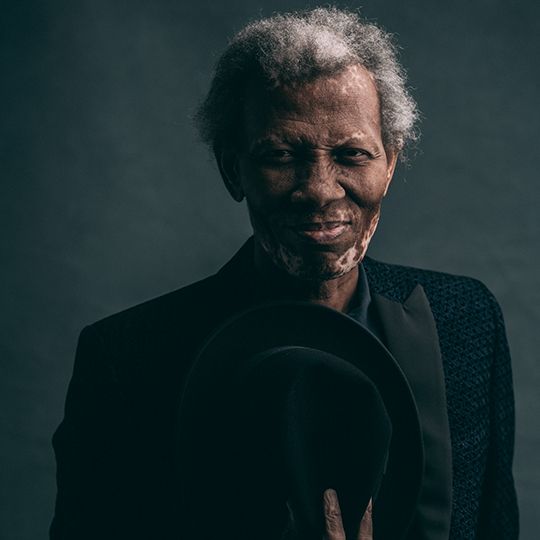Food
Meet Wilfred Emmanuel-Jones, aka The Black Farmer
by Helen Renshaw
The movie of his extraordinary life would be dismissed as far-fetched, but now Wilfred Emmanuel- Jones MBE, aka The Black Farmer, is on a mission to change the world...

Browse The Black Farmer website and you may be surprised to discover a series of flameco-themed images...
Here - among bucolic scenes of his Devon farm - are images of the sausage empire's founder Wilfred Emmanuel-Jones MBE,resplendent in matador finery, performing what looks like a perfect 10-score paso doble on Strictly. What, you may reasonably ask, has this to do with sausages?
Wilfred is rightly proud of The Black Farmer’s renowned product – but there’s much more to him than award-winning bangers. And as the story of his extraordinary life unfurls, his quirky photoshoot begins to make sense. ‘Nothing about me adds up,’ he says. ‘I’m black, but a farmer. I was born in Jamaica, but make a quintessentially British product. I love morris dancing. I’m passionate about flamenco. Not what you expect? Good. I’m not interested in being put in a box. What interests me is shaking things up. What drives me is changing the world.’
Wilfred’s journey from impoverished immigrant to multimillionaire farming legend has been unconventional, to say the least. Born 63 years ago in rural Jamaica, he came to the UK aged three. The family settled in inner-city Birmingham. ‘We were very poor,’ he says. ‘Mum had to feed 11 with one old broiler hen. She had to be inventive, tenderising the meat and packing it with flavour using fabulous spices.’ School was a disaster. Wilfred suffered from severe dyslexia and left at 16, barely able to read or write. But he found joy cultivating veggies on his dad’s allotment, and a lifelong love affair with food was born. ‘It was my oasis,’ he says. ‘That connection with nature; the food we eat. I made a vow to one day own my own farm.’
After school, he joined the army – and was promptly kicked out with a dishonourable discharge. Next stop was catering college, and a future of flipping burgers beckoned. But Wilfred is cut from special cloth. Somewhere within, an ambition to make BBC food documentaries was taking shape. ‘Audacious’ is a word Wilfred applies to himself, and the notion of an inner-city boy taking on the Oxbridge elite sums it up.
And he succeeded – landing a menial job at the BBC and meeting industry insiders (his ‘guardian angels’) who saw something exceptional in the young man packed with determination and a passion for food. For 15 years he was producer/director on food programmes, giving the likes of Gordon Ramsay and James Martin their TV breaks. ‘People like me often end up on society’s rubbish heap,’ he says. ‘But you can achieve anything you want in life, so long as you have ruthless focus, passion – and someone to give you a break.’

At 40, Wilfred achieved his dream and bought a 30-acre idyll on the Devon/Cornwall border. His London friends thought he was bonkers. ‘But I’ve experienced more racism in cities,’ he says. ‘Even now, in the city receptionists assume I’m a minicab driver. But in Devon, once you’re accepted, you’re part of the community. I was born in the heart of Jamaica, where subsistence farmers work the land, and I’ve always thought it was in my DNA.’
Wilfred saw a gap in the market for truly exceptional British bangers and The Black Farmer brand was launched with the help of his wife, Michaela. Wilfred’s multi-award-winning sausages are gluten-free, 90% British pork and flavoured with Wilfred’s ‘special seasoning’ (think pepper, nutmeg, sage and parsley). ‘Anybody who eats our sausages will tell you there’s a real personality to them,’ he says. ‘It’s like eating a steak.’ And the sausage-buying public agrees. By his mid-50s, the millions were rolling in. Time, surely, for Wilfred to enjoy the spoils of his success? No such luck. Life had its biggest challenge yet in store. In 2014, he was diagnosed with acute myeloid leukaemia, and doctors told him he had a 20% chance of survival. The only hope was a revolutionary stem cell transplant, which saved his life but caused life-threatening graft-versus-host disease.
‘It’s the only time I’ve been in absolute despair,’ he says. ‘I felt death would be better than the struggle I was going through.’ He still has regular check-ups, but he’s well now. And there’s nothing like a near-death experience to concentrate the mind. ‘Being at death’s door makes you think about what’s really important,’ he says. ‘The fact I’m alive today is because the gods have something in store for me to do.’ Nowadays, top of Wilfred’s to-do list is campaigning against the underrepresentation of black people in the food industry.
Last October, he persuaded retailers to support Black History Month by stocking sausages featuring black British heroes. And he’s on a mission to transform farming from a ‘closed shop’ into a career open to young people from minority ethnic backgrounds. ‘The farming industry needs shaking up,’ he says.
‘I’d love to see brilliant young people from urban communities bring innovation to the countryside. ‘Everything I’ve done in my life has been about reaching for the stars and having the audacity to believe I could reach them. I want my legacy to be a person who’s brought about change for others, too.’
Try these delicious recipes:












